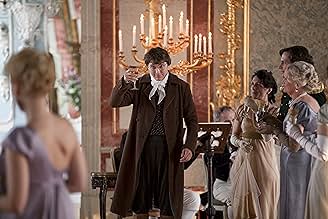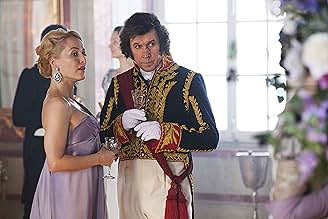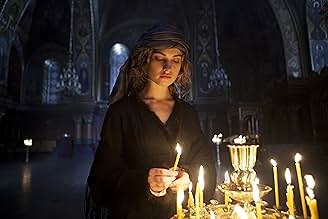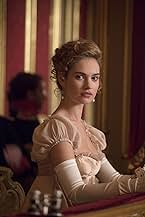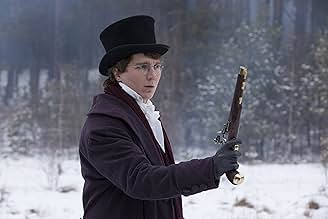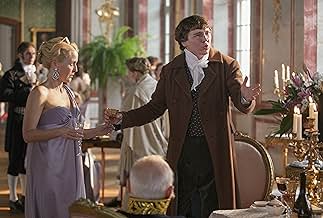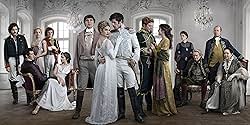À medida que o conflito russo com Napoleão chega ao fim, cinco famílias aristocráticas enfrentam a perspectiva de ter suas vidas mudadas para sempre.À medida que o conflito russo com Napoleão chega ao fim, cinco famílias aristocráticas enfrentam a perspectiva de ter suas vidas mudadas para sempre.À medida que o conflito russo com Napoleão chega ao fim, cinco famílias aristocráticas enfrentam a perspectiva de ter suas vidas mudadas para sempre.
- Indicado para 1 Primetime Emmy
- 3 vitórias e 19 indicações no total
Avaliações em destaque
Frankly, people, those who are so negative about this miniseries seem to have watched something else altogether different or need go back and reread the book (if they ever did) and rewatch the Bondarchuk version (ditto). Unlike their claims, it's so happens that the miniseries is actually quite close to the book and a very honorable rendition of Tolstoy's work. Certainly, it doesn't portray Tolstoy's lengthy disquisitions on history and so on, obviously because they are not cinematographic. As to casting, people seem to forget that Bondarchuk, then in his forties, cast himself in the role of Pierre-and he didn't happen to be a very good actor, to boot! Fonda was clearly badly cast, but so was Bondarchuk with the aggravating circumstances that in his case it comes across as a vanity thing. This round goes to Dano, who is an excellent actor and way closer in age to the character.
The other role that seems to have particularly grated on people is Natasha. But in Bondarchuk's film, the role went to a ballet dancer, with no acting experience except for the artificial miming required in the 19th century classic ballets. And this shows bigly, as she plays Natasha as though she were dancing the role! As a former dancer who has also been trained in acting, I can vouch for the differences between the two performance genres and how an unpondered transfer of techniques used in one don't necessarily transfer well to the other. Watching her enact Natasha is excruciating as her gesturing, posturing, and body movement, very obviously coming from ballet miming conventions, are quite artificial and stilted. She simply looks like she strayed into the series from a performance of Swan Lake. Lily James is a perfectly good actress and this round goes to her as well.
All in all, while I can't speak of all the versions out there since I've only seen Hepburn's, Bondarchuk's, and this miniseries, I think this the best of what I know. And I appreciate it greatly for its cohesiveness, faithfulness to the original, excellent production values, acting, and overall quality.
Lily James is perfect as Natasha Rostov. She excels at capturing all the moods of a young girl's coming of age, from giddy excitement to tearful despair to frank curiosity about men and sex. The thing about Natasha is that she has to be as natural and exuberant in a fabulous ballgown surrounded by glittering aristocrats as she is in a log cabin making merry among the Russian peasants. That's a lot to take on and Lily James manages it all perfectly. Bravo!
James Norton and Jessie Buckley are both tremendously impressive as the Bolkonsky siblings, Andrey and his sister Marya. Both of them capture how deeply spiritual their characters are, in very different ways. Prince Andrey's search for meaning leads him to a near death experience on the battlefield, but his spiritual longings come across clearly even when is acting the part of a haughty aristocrat. Jessie Buckley's longing for her father's love is beautifully expressed, as is her devotion to Christian love in general. In the book Tolstoy suggests that Princess Marya's goal is simply "to love men as Christ loved men" and that quality is evident in every scene she plays.
I had a lot of trouble accepting Paul Dano as Pierre Bezukhov. So much of Pierre's stature in the novel comes from . . . well, from his stature. He's described over and over as being tall, broad shouldered, clumsy, too big to fit indoors, moving like a big bear. His childlike qualities, his kindness and trusting nature, are balanced out by a gigantic and often menacing physical presence.
Now, Paul Dano gets the childish side of Pierre perfectly, but in the darker moments there's definitely something missing. Even when he's a prisoner of the French he comes across more like Billy Pilgrim in SLAUGHTERHOUSE FIVE than like the Pierre of the book, who is looked upon by both prisoners and guards as a natural leader. I think there's a tendency today to downplay brute male strength as a positive asset, and Paul Dano's casting is symptomatic of a kind of bizarre politically correct form of censorship. But after all, this is a very multi- faceted character, and Paul D. certainly does capture Pierre's gentleness and kindness.
I don't want this to be a ten page review, so I just want to say that the rest of the very large cast is absolutely extraordinary. While Andrey, Pierre, Natasha and Marya are so complex that no actor could really capture them completely, there are dozens of lesser characters who actually come more to life in this mini-series than they do in the book itself. I just want to mention very briefly the following performances:
Tom Burke as Dolohov and Thomas Arnold as Denisov . . . these two characters are like book-ends, the good guy soldier and the bad guy soldier. And the two Toms nail them perfectly!
Aisling Loftus as Sonya was a true revelation. Reading the book as a kid, I always felt like Tolstoy had it in for Sonya. She's the poor relation who always gets left out in the cold, and Tolstoy does a lot of victim-blaming to rationalize how the system works. But Aisling Loftus gives Sonya a depth, strength, and courage that's actually better than what's in the book!
Greta Scacchi and Adrian Edmondson as Countess Rostov her husband Count Rostov. So much of the magic of WAR AND PEACE comes from the sense of family warmth and happiness in the Rostov home. These two actors really make you understand why Nikolay and his sister Natasha are so much loved and so at home in the world, because they grew up with the most loving parents imaginable! Even their flaws are endearing and totally believable.
Tuppence Middleton and Callum Turner really make an impression as the evil, deadly siblings, Helene and Anatole Kuragin. The two of them are like a perfectly matched pair of dragons, or a couple of deliciously deadly vampires set down among the unsuspecting nobility! But the actors find something sad and almost desperate about both of them, keeping them real and capturing the humanity of Tolstoy's vision even with characters he painted in very broad strokes.
The highest compliment you can pay to this production is that the great characters are represented in (almost) all their complexity, and that there are minor characters who are more real here than they were on the printed page. What a fabulous achievement for the writer, the director, the fabulous cast and the BBC!
War and Peace is a story of mortals, fallible, corrupt, and yet full of love and hope. Some of the reviewers seem to have gotten in their head that Prince Andrey or Natasha should be like gods and goddesses when Tolstoy could not have intended anything farther from that. Tolstoy meant for us to see how the lives of admirable men and women are yet filled with foolishness. We are meant to see that in the end, the foolishness shouldn't matter.
Others seem to be aghast that there's infidelity, violence, and dishonesty. My God, I can only imagine that these reviewers would be better off watching Barney and Friends. This adaptation captures brilliantly Tolstoy's view of how terrible the course of human interaction can run, and yet there is something magical to life.
As far as the casting goes, I personally thought Sonya was a little too plain, Princess Marya a little too attractive, and Pierre rather too skinny, but these physical quibbles are nitpicky. Each performance seems true to Tolstoy's characterizations, if not the idealizations people have conjured in their minds. In my view, Denisov, though a minor character, is particularly brought to life. The old Prince Bolkonsky also is terrific.
Finally, I am no expert on 19th century Russian aristocratic dress or interior design, but frankly I saw nothing particularly out of place. I would be quite surprised if any of the reviewers who took issue with the costumes or the decorations were far more knowledgeable.
Você sabia?
- CuriosidadesThe soundtrack is recorded in a collaboration with choir "Latvia" and Latvian Radio.
- Erros de gravaçãoUniforms in the Russian army changed three times during the period covered in the movie, but there is only one shown in the series.
- Citações
[last lines]
Pierre Bezukhov: [voice-over] They say sufferings are misfortunes. But if I was asked, would I stay as I was before I was taken prisoner, or go through it all again? I would say for God's sake, let me be a prisoner again.
Pierre Bezukhov: Come, let's sit and eat and give thanks for our good fortune.
Pierre Bezukhov: [voice-over continued] When our lives are knocked off course, we imagine everything in them is lost. But it is only the start of something new and good. As long as there is life, there is happiness. There is a great deal... a great deal still to come.
- ConexõesFeatured in The Wright Stuff: Episode #21.5 (2016)
Principais escolhas
Detalhes
- Data de lançamento
- País de origem
- Centrais de atendimento oficiais
- Idiomas
- Também conhecido como
- War & Peace
- Locações de filme
- Lituânia(Vilnius)
- Empresas de produção
- Consulte mais créditos da empresa na IMDbPro



